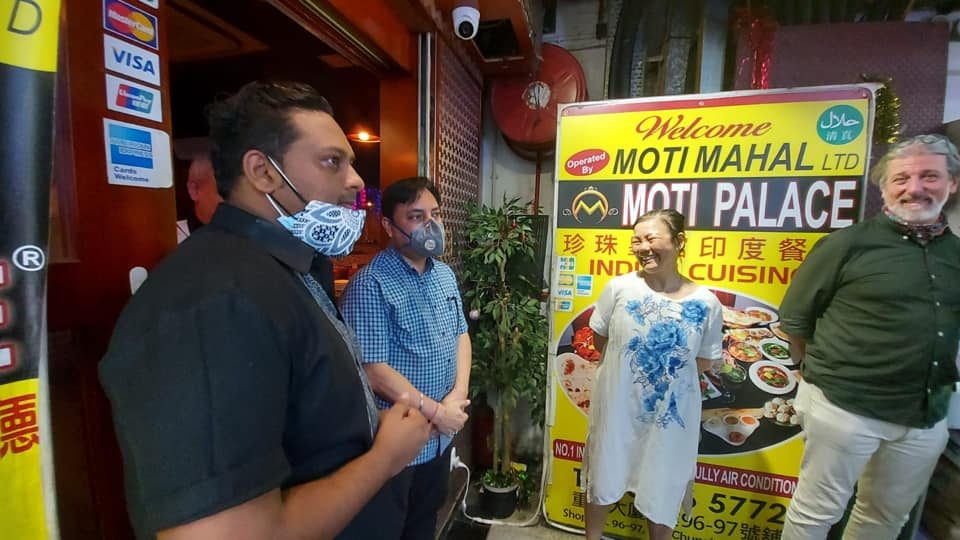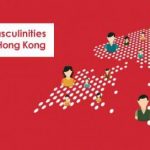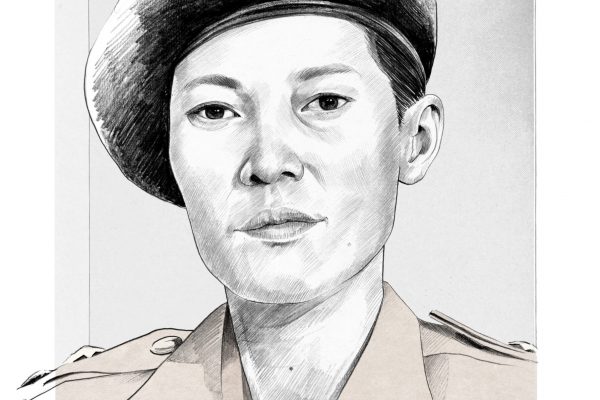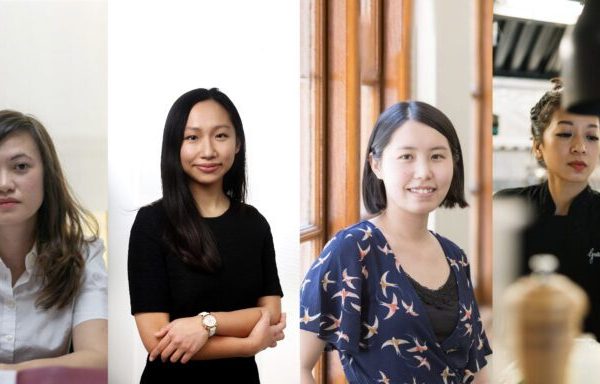Hong Kong politician Jeffrey Andrews says city must improve its treatment of ethnic minorities
Growing up in Hong Kong as a third-generation Hongkonger of Indian descent, local politician Jeffrey Andrews has faced discrimination and othering on countless occasions for being an ethnic minority. Despite its status as an international and multicultural city, he says, Hong Kong rarely sees moments of racial harmony and inclusion.
The 35-year-old social worker and aspiring politician recalls being stopped by the police, he suspects, because of the colour of his skin. And on the football field, Hongkongers refused to play with him. Some even spat on him, calling him ‘a black ghost’.
“I often asked my mum, ‘Why was I born with this skin colour?’” Andrews recalls.
Andrews grew up feeling self-conscious, not only due to the bullying but also because he found it difficult to assimilate into local Hong Kong society. According to the 2016 Population Census, there are roughly 585,000 non-ethnic Chinese residents in Hong Kong, accounting for about 8 per cent of the population. Back when Andrews was growing up, that number would have been closer to 5 per cent. Most are of Indonesian, Filipino and Indian descent.
While taking only basic Chinese-language classes from school, Andrews says he gradually picked up Cantonese by watching local TV dramas, movies and talking to Chinese-speaking people, which helped him communicate and fit in on the football field.
However, Cantonese proficiency is unusual for ethnic minority children in Hong Kong. According to a 2018 survey conducted by Democratic Alliance for the Betterment and Progress of Hong Kong (DBA), a pro-establishment party in the city, 60 per cent of 350 ethnic minority students surveyed said they could not master Chinese because the language was ‘very difficult’. In addition, 50 per cent of respondents also said they didn’t have a chance to practice with local speakers.
On a fundamental level, Andrews believes the education system hurts minorities’ chances of integrating into society.
“Although I was born in Hong Kong, I had to attend a [unofficially] segregated school where I studied with other ethnic minorities,” he says. “As a result, it was very difficult for my ethnic minority friends and I to learn Cantonese and to integrate into the Chinese community because we could only speak English.”
Due to a lack of Cantonese language skills, many ethnic minority students also struggle to enter universities or find a job. As for Andrews, he left school at 16 and joined a triad gang. “It is very common for young ethnic minorities in Hong Kong to join the mafia because they don’t need to know how to read or speak Chinese in order to be a part of it.”
For the next two years, Andrews’ life revolved around selling drugs, stealing, fighting and partying. In the back of his mind, he knew that his life was going downhill but he didn’t make a change until he hit rock bottom.
In 2005, he and his friend from the triad gang robbed a man, stealing his phone in Wan Chai. The duo ran away separately and Andrews jumped on a red minibus, thinking that he could get away as well. But six officers, he says, got on to the bus and pulled him off.
“At the police station, I saw my name on a whiteboard. Next to my name, they wrote ‘ethnic minority’ and ‘robbery’. I thought to myself, ‘I am just another negative statistic from my community,’” he recalls. “It was a moment of awakening to me. I knew that I could not continue this life anymore.”
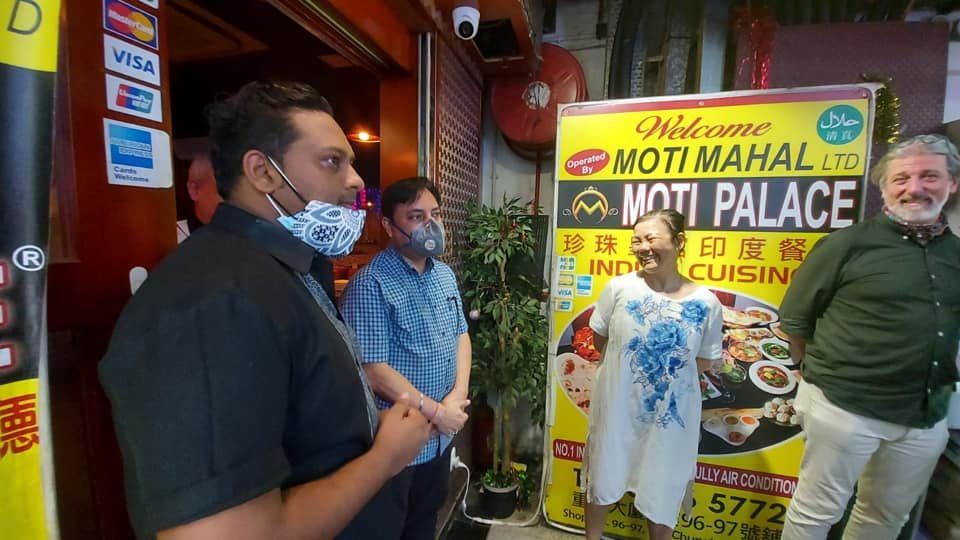 Jeffrey Andrews (left) visiting local shops during his campaign tour. Credit: Jeffrey Andrews
Jeffrey Andrews (left) visiting local shops during his campaign tour. Credit: Jeffrey Andrews
Making changes for ethnic minorities
Andrews got lucky. At his trial, the judge did not sentence him to jail but granted him a one-year bind-over, which meant that if he committed another offense within that year, Andrews would go to jail immediately.
During that year, Andrews worked hard to get back on the right path. He took a one-year hotel management course at the Hong Kong Institute of Vocational Education, a higher education institution that offers vocational training to post-secondary students. He then joined a local hotel as a full-time housekeeper for a stint before turning his focus to volunteering with ethnic minorities.
Volunteering eventually turned into social work and, in 2009, Andrews led a group of asylum seekers in Hong Kong to participate in The Homeless World Cup held in Milan. He also worked closely with Fermi Wong, a social worker advocating for the rights of ethnic minorities. The duo reached out to various government departments, asking them to help ethnic minorities to receive higher education.
“We believe that [higher education] is the key to end the vicious cycle of crimes and unemployment [among the ethnic minority], but every government official we talked to said that the ethnic minority needed to be able to read and write Chinese,” he says. “But how can you expect them to speak a language that you haven’t taught them?”
As he turned his life around, Andrews was determined to make more positive changes. Since 2009, he has been working for Christian Action, an NGO that serves the disadvantaged and marginalised people in society. “I want to help those who are going through what I had experienced in the past.”
Every year, Andrews says he helps around two to three ethnic minority youth with a criminal record. One was a 19-year-old Pakistani man. “He was arrested in 2018 for possession of several grams of drugs. He asked for my help right after he got out of the police station.”
In general, I don’t think Hong Kong-Chinese people are racist; they have misconceptions about ethnic minorities because there is a lack of mutual understanding.
Since then, Andrews helped the young man gather character references to submit to the police. He also helped him find counselling and enrolled him in a drug rehabilitation programme. “They are still very young. If they really get a criminal record for this, the future will be very difficult for them,” he says. The young man eventually received a one-year bind-over which he completed without any issues, according to Andrews.
To promote ethnic integration in Hong Kong, Andrews gives talks at local schools and institutions such as Queen Elizabeth Hospital. He also organises “cultural tours” to Chungking Mansions, which is home to a diversity of ethnic minorities, including Indian, Pakistani and African descendants, with an ambition to paint the building and its inhabitants in a positive light.
“A lot of ethnic Hong Kong-Chinese people whom I have spoken with didn’t realise that many ethnic minorities in Hong Kong were born locally, but the education system makes it hard to learn Chinese,” he says.
“But in general, I don’t think Hong Kong-Chinese people are racist; they have misconceptions about ethnic minorities because there is a lack of mutual understanding. That’s why I keep bringing Hong Kong-Chinese people into Chungking Mansions and letting them talk to the ethnic minority directly. They can understand the challenges and difficulties they face, and then their perceptions change immediately.”
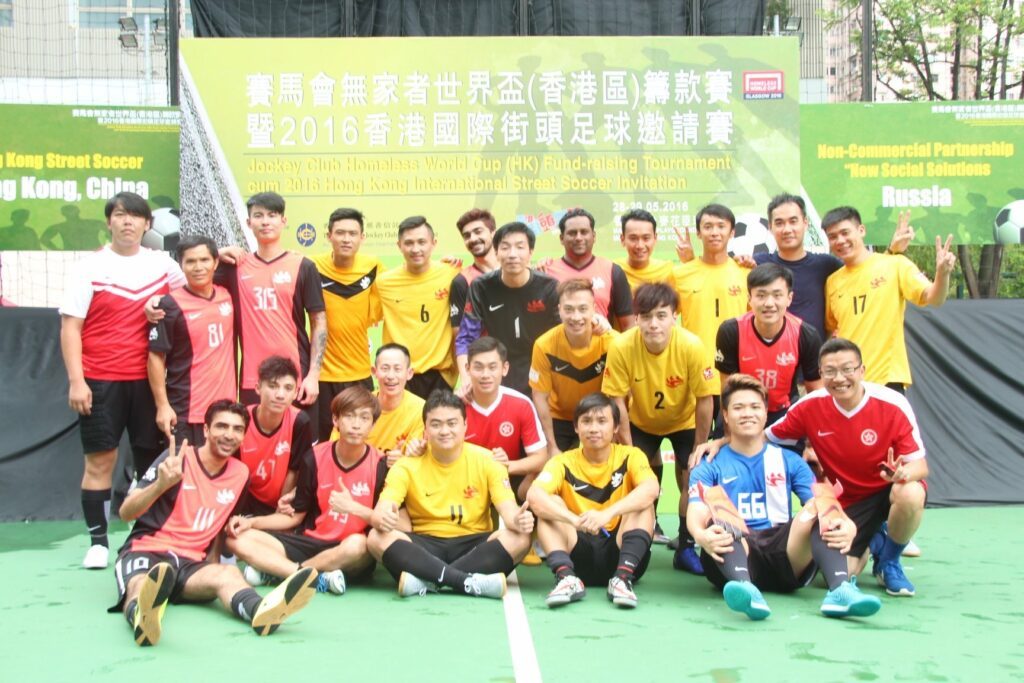 Jeffrey Andrews (back, center) with his local football team. Credit: Jeffrey Andrews
Jeffrey Andrews (back, center) with his local football team. Credit: Jeffrey Andrews
Raising his voice in Hong Kong
A decade after that rock-bottom moment at the police station, Andrews is a new man. In 2014, he became the first registered social worker of Indian descent in Hong Kong. In October 2019, he received the Ten Outstanding Young Persons Selection (TOYP Selection) award, an annual award by leadership development organisation Junior Chamber International Hong Kong that recognises young citizens who have made positive changes in Hong Kong society. Since then, he has become a notable figure within the ethnic minority community.
But after years of lobbying the government and advocating for change without results, Andrews finally lost his patience. He realised that talks and events alone would not improve the status of ethnic minorities in Hong Kong. They need real policy changes, including education reform, discrimination protections, anti-racism campaigns and culture-sharing initiatives.
He also suggests that the government establish a commission that specifically handles affairs relating to ethnic minorities, such as labour and discrimination. That way, “ethnic minorities can seek help from one department and don’t need to go through the entire bureaucratic process.”
Hoping to create these changes himself, Andrews became the first ethnic minority to run for local council in June 2020. “For many years, ethnic minorities have had no voice in the Legislative Council. I feel that I have the responsibility to represent the ethnic minority,” he says.
Throughout the 2020 Democratic Party presidential primaries, Andrews says he enjoyed campaigning on the streets. It offered him a chance to talk with his neighbours and listen to their concerns. “We have shown the people in Hong Kong that ethnic minorities are also part of society and we also care a lot about this city,” he says.
Unfortunately, recent social unrest and the implementation of the National Security Law in July complicated the election. Andrews believes that current social concerns will shift ethnic minority rights to the back burner in the short term, he says.
Andrews’ bid for the election was ultimately unsuccessful. But he says the results won’t deter him from trying again in the next election in 2024.
“Though I didn’t win, a lot of people still appreciated that I am raising a voice for ethnic minorities. They encourage me to keep representing them,” he says. “This is the spirit of our Hong Kong. Everyone should have a chance to speak up, no matter what ethnic background and what political view you have.”
